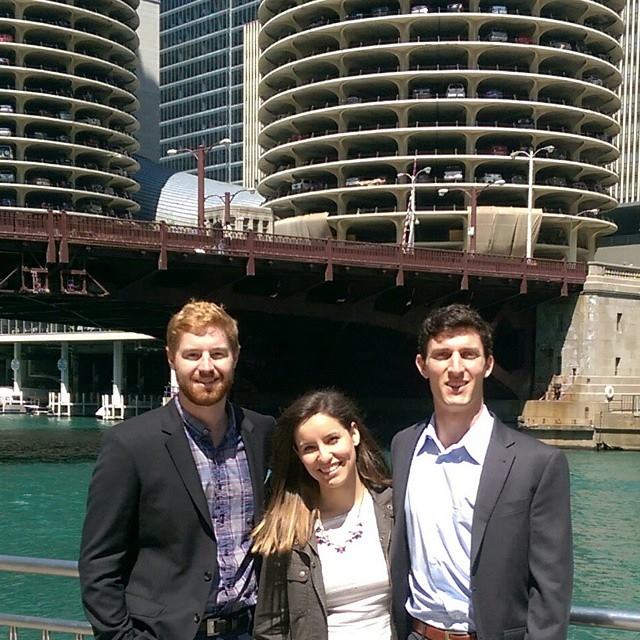
If you’re looking for reassurance that today’s energy problems are being considered by the best and the brightest our generation has to offer, look no further than the 117 EDF Climate Corps Fellows deployed across the country this summer.
The fellowship program recruits and trains top graduate students, traditionally from MBA and engineering programs, and places them in leading institutions to identify energy saving opportunities. This summer, I had the pleasure of working alongside two other Climate Corps Fellows at Sustainable Jersey, a nonprofit organization that guides municipalities and school districts towards sustainable actions through their certification programs. The three of us worked as field agents in New Jersey public school districts, engaging them in energy efficiency projects and working through barriers to implementation. During the 10-week fellowship, I found myself seamlessly applying the skills I’d developed during my first year at Presidio Graduate School (PGS).
Here are the three most valuable lessons I took with me.
1) PGS made me a systems thinker
A systems-thinking approach to problem solving is one of the fundamental tenets of the PGS education, woven into the curriculum from the very start. The tie-in to the Climate Corps Fellowship is essential; successful project implementation necessitates an approach that analyzes the larger systems at play. For me, this meant considering all relevant stakeholders involved in energy management in the public school districts and thinking creatively about how to involve them in project implementation. Many of the schools we worked with this summer had already taken great efforts to further energy efficiency measures in their buildings. Often times, however, these projects were conceptualized, implemented, and managed by a small group of staff in the schools that were not integrated into the broader decision making process occurring in different branches of the organization. One of the key focuses of our fellowship was to set up systems that encouraged collaboration among different actors: facilities, business administration, custodial teams, accounting, faculty and teachers, and the Board of Education for each district. Buy-in from all groups across the organization dramatically increases the rates of success of even the most ambitious renewable energy projects, and thinking critically about how to build systems that encourage discussion and accountability among all the different players was instrumental.
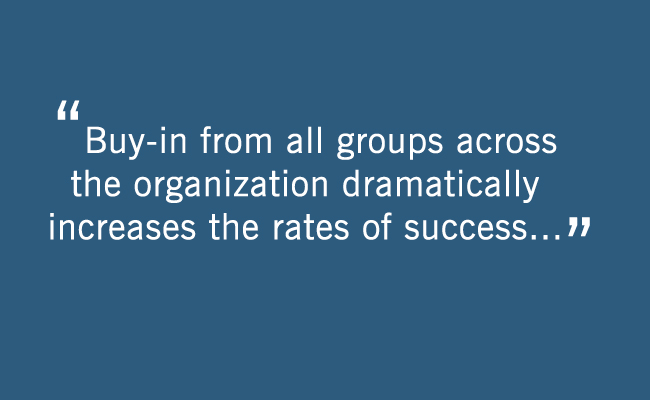
2) PGS made me a secret agent
During his keynote speech at the Climate Corps Fellow training event in Chicago, Greenbiz editor and former VP of Corporate Social Responsibility and Sustainability at McDonald’s, Bob Langert, challenged us all to be “secret agents” of change. We need, he explained, to work quietly within the existing culture of our organizations rather than boldly announcing ourselves as sustainability champions.
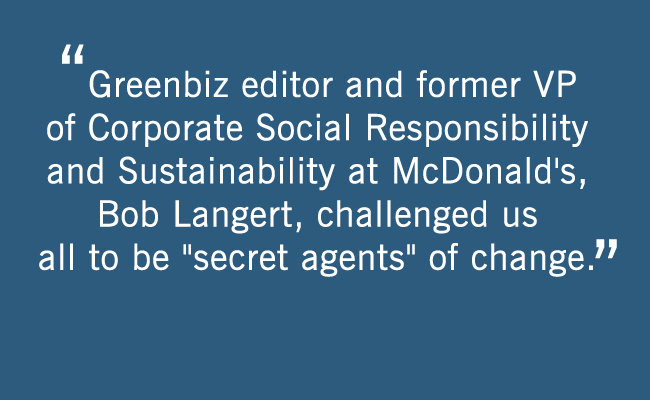
Indeed, making a case for sustainability is most difficult when there are no other up sides, when the only persuading argument is that it’s the “right thing to do.” Fortunately, building a strong business case for sustainability projects is a primary focus for our work at PGS. Although the changes we were advancing in New Jersey school districts are critical to addressing a number of key sustainability issues such as climate change, dependence of fossil fuels, and local air quality, among others, I was able to build support among key administrators by understanding their interest; which, not surprisingly, often was bottom line cost savings. Despite these savings, projects are sometimes still difficult to coordinate along with the myriad of priorities demanding the attention of administration. Being a successful secret agent of change requires making a convincing case for sustainability projects while addressing the challenges of a particular organization, often without using the word “sustainable” at all.
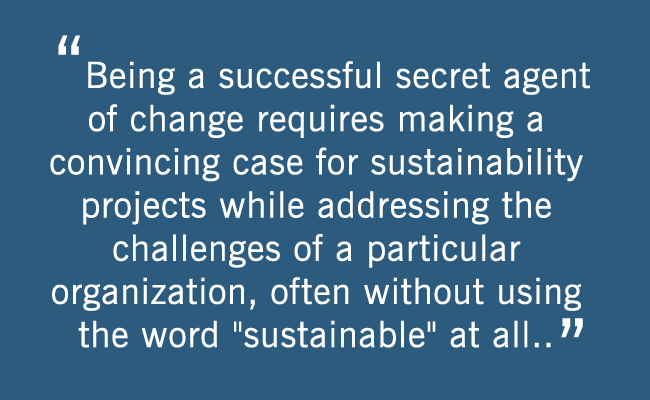
3) PGS made me a storyteller
At its heart, sustainability is about storytelling, and so often the work we do is only as valuable as the story we can tell about our accomplishments. At the end of the summer, the other Sustainable Jersey fellows and I had the opportunity to present our summary of findings in front of New Jersey’s Board of Public Utilities (BPU) at their Energy Efficiency Committee meeting. It was an incredible opportunity to talk to the state’s leading energy energy efficiency decision makers and advocates about the work we’d done over the summer, as well as to present a set of recommendations based on the barriers that school districts were experiencing day to day.
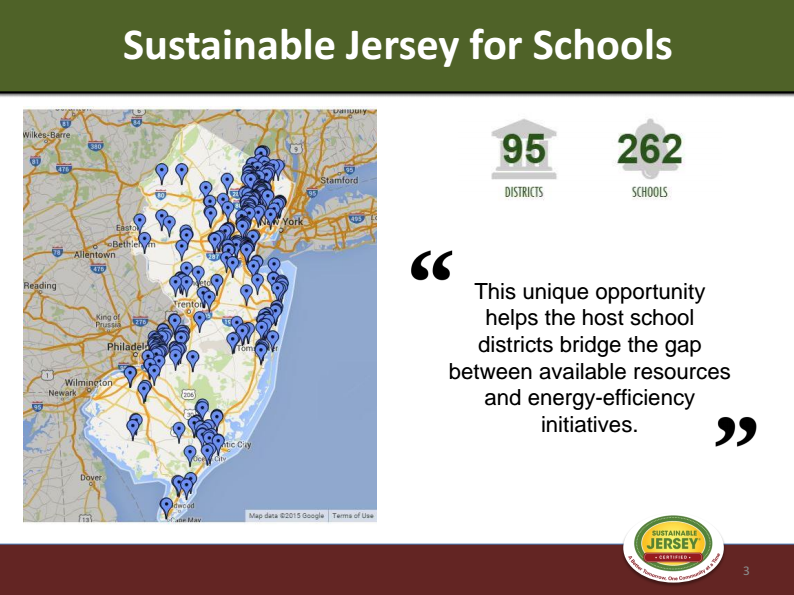
Fortunately, the Effective Management Communication and Action (EMCA) class I took in my first semester at PGS left me with the skills necessary to address the most important challenge of crafting our presentation: who was our audience and what did they most care about? The answers to those questions steered the story that we told about our work. We relayed anecdotes and data about specific challenges school districts were facing related to some of the State of New Jersey Clean Energy programs, and recommended solutions they were in a position to employ. Feedback from our summer working in the field helped illuminate the reality of the barriers to energy efficiency for school districts, and this understanding will allow New Jersey to craft programs that are better attuned to local needs and practical realities.
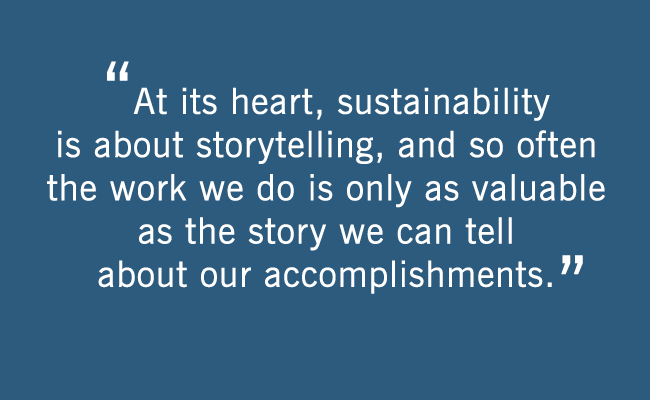
The fellowship this summer is the product of a dynamic collaboration that exists among sustainability proponents in New Jersey across different sectors. Our engagement with Sustainable Jersey was funded by an investor owned utility – New Jersey Natural Gas – who has been involved with the EDF Climate Corps program for the last six years. Working with Sustainable Jersey, a non-profit organization, the fellowship placed the resources of academia and higher education in the field to help public schools address major sustainability challenges. Sustainable Jersey is codifying the lessons learned and continues to spread best practices and new resources to the 428 municipalities and 284 school districts taking action to create a more sustainable future for New Jersey residents.

